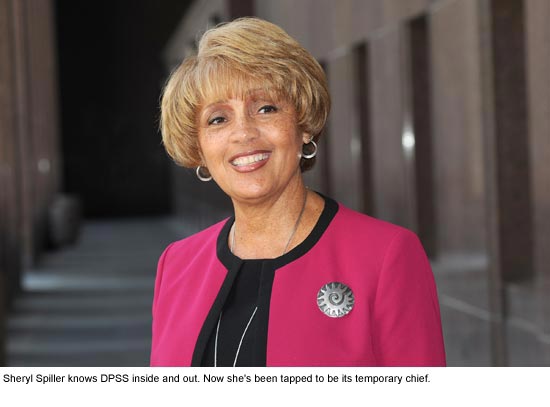From typist clerk to the top at DPSS
August 17, 2011
It’s funny how the little things can shape a working life.
Like that summer day in 1967 when Sheryl Spiller, fresh out of Centennial High School, went downtown to the county Hall of Administration with some girlfriends looking for summer jobs.
“I didn’t want to work for the county. But I didn’t want to wait outside either!” So Spiller went inside, aced the test and set off on a county career that has taken her from typist clerk to acting department head.
Spiller is taking the reins of the Department of Public Social Services from Philip Browning, recently named to temporarily head the troubled Department of Children and Family Services.
She’s not sure how long it will last, but it’s all happened so fast that “I don’t have time to fret over it,” she says.
Fretting doesn’t seem to be part of her make-up, in any case.
She’s built her career with a combination of front-line work, strategic savvy and a commitment to helping those around her grow on the job. And with more than three decades of DPSS service under her belt, there’s not much she doesn’t know about the department she’s been chosen to temporarily head.
“Staff jokes about not being able to get stuff by me. I’ve been there, done that,” says Spiller, the agency’s chief deputy director until her temporary appointment this week. Except for 3½ years in the county’s Child Support Services Department, where she first worked with Browning, her entire career has been within DPSS.
Browning calls her “an amazing lady” who’s been generous with her deep knowledge of the department and its people. “I think it’s remarkable that an individual could remain within one organization and have that kind of a presence and an impact,” he says.
“She’s a true, genuine leader,” adds a former boss, Joseph Guerra, now retired as the department’s assistant director. He credits her with a number of innovative contributions, including a pioneering outreach campaign to enroll uninsured children in the Healthy Families program—part of a larger initiative she headed to sign up more than 100,000 kids for Medi-Cal.
Spiller doesn’t foresee any big change of course for DPSS on her watch.
But her own role will be turned inside out.
Accustomed to working behind the scenes, Spiller now will be a more visible presence—front-woman for an agency charged with serving millions of the county’s neediest residents with programs including CalFresh (formerly known as food stamps), in-home services for the elderly and disabled and general relief assistance.
“I’ve always been the person on the inside, always had a focus on our human resources. Philip’s always been the public face of the department…I am going to have to make that shift,” she says.
Ever-shifting career challenges have had a way of turning out well for Spiller. “I would volunteer for everything, wherever the jobs were. I took some of the worst assignments.”
That included a stint at a welfare office then known as the “Unattached Men’s Center” in downtown Los Angeles, where female employees were rare at the time and the district director’s office featured a collection of knives and guns confiscated from the clientele.
“It was a really rough area,” she says. But “I didn’t even think about being afraid.”
She fondly remembers her time working at the DPSS facility nicknamed “The Pink Palace” (the name, and the colorful paint job, have passed into history but the office is still there, at Adams and Grand.) After that, she ran a section charged with coming up with innovations, such as simple, illustrated customer comment cards, that are still in use today. “It gave me an opportunity to be creative,” she says.
Her toughest challenge—although ultimately one of her most rewarding assignments—was going into the Compton office as its district director in the early ‘90s. She had to clean house; among other things, several employees were arrested on drug charges after a sheriff’s surveillance operation. And then there were those bullet holes in her office window—the consequence of being in what was then an active border area for three gangs. Internal Services Division came to the rescue with bullet-resistant glass. “Sheryl, it’s not bullet-proof,” they told her. “But it’ll slow it down.”
Working within a large organization to get things done—like knowing who to call to get those windows fixed quickly—goes along with Spiller’s broader philosophy of networking, educating and mentoring.
Whether setting up an on-premises program for employees in Compton to get their associates’ degrees or working actively with the county’s Management Council to help other managers hone their skills, Spiller says her “personal goal is to leave the department with highly educated, well-trained, success-oriented, self-motivated and healthy employees.”
She’s aware that her own professional narrative is an asset. Her rise from the clerical corps to the top ranks of management reads like a textbook case study, and in fact, a step-by-step account of it appeared in a workforce development publication put out as part of a collaboration between the county and the SEIU local representing many of its workers.
Spiller, 61, still keeps in touch with her old high school principal, who had counseled her to jump on the county track and get her college degree while she worked. (She ended up getting three, including a master’s in human resources and organization development from the University of San Francisco.)
She recently got on the phone to share with him the news of her most recent career move, to acting head of the agency where she’d started as a typist clerk back in ‘67.
“You won’t believe this,” she said, “but remember that advice you gave me 40 years ago? Well, it paid off.”
Posted 8/17/11













 405 bridge work causes a stink
405 bridge work causes a stink
